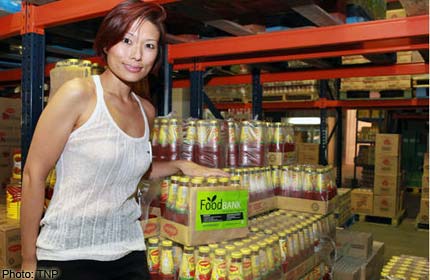
It may sound strange, but loss of face is one reason for food suppliers holding back when it comes to donating surplus food to the needy.
Says Madam Nichol Ng, who founded Singapore's first food bank with her brother Nicholas:"While food companies in other parts of the world see donating to food banks as part of fulfilling corporate social responsibility and giving to their communities, some in the food industry here worry that doing such a good deed gives competitors the impression that their business isn't doing well."
The 35-year-old adds: "A notable bak kwa company here we approached to donate (food) asked if the person collecting the surplus would tell (its) competitors."
The Food Bank Singapore, which was set up about a year ago, acts as a redistribution channel to collect unused or unwanted food so it can be allocated to entities such as old folks' homes, family service centres and soup kitchens.
The non-profit organisation receives biscuits, canned food and rice on an ad hoc basis, but has yet to secure regular pledges.
Many food suppliers are also sceptical about how feasible the organisation's mission is, says Madam Ng.
"Sometimes we get asked about whether we're going to take the food and re-sell it," she says with a chuckle.
Madam Ng's experience in running her family business, FoodXervices Inc, which provides restaurants and supermarkets with canned food and other supplies, has stood her in good stead when it comes to running Food Bank.

Last year, Singapore chalked up 703,200 tonnes of food waste, according to figures published on the website of the National Environment Agency (NEA).
This is a 26 per cent jump from the 558,900 tonnes produced in 2007.
Of this amount, only 12 per cent was recycled.
"This comprised mainly clean food waste such as spent grains from beer brewing, bread waste and soya bean waste, which are converted into animal feed," says an NEA spokesman.
The rest of the food waste generated comprised uncooked kitchen waste and leftovers from meals.
The waste is disposed of at incineration plants, which use heat produced to drive generators for electricity, she adds.
Spotting wasted food is easy in this affluent country; all it takes is a visit to a buffet line or a bustling hawker centre.
But leftover char kway teow is not all that is being discarded.
High-end hotels and restaurants often nitpick when it comes to the canned food they accept from suppliers, explains Madam Ng.
Cans with the slightest dent do not make the cut, but are returned to suppliers like Madam Ng's company.
She says: "I sell in loose quantities, so it's not so bad because I can find another client who may not mind.
"But for suppliers who sell their canned goods in cartons, one dented can could mean the entire batch is discarded."
Another way good food goes to waste is when there is a mistake in brand labelling or when the expiry date is printed wrongly.
"We once received a donation of more than 900 cartons of biscuits meant to be shipped to China, but produced in Indonesia.
"The biscuits were missing some Chinese words, so the client wanted to dump it. We collected and redistributed them," Madam Ng recounts.
Large supermarket chains often have arrangements with suppliers like her, who are required to refresh items on shelves weeks or months before they approach expiry, explains Mr Govindarajan Parimelazhagan, who runs online grocery store Go Shop Easy.
"When you run a physical store, you simply can't let the shelves be empty. It doesn't look good," he comments.
"Once products approach the expiry dates, flash sales are held to clear the stocks. Otherwise, they are usually disposed as suppliers don't want to take the risk that a consumer consumes expired food and the company get into trouble because of it," he says.
Madam Ng and her team of about 50 who manage the food bank try to salvage such surplus stocks.
"The expiry date may be nearing, but before that, they can still be redistributed to those who need it," she says.
Most companies are worried about the liability that comes with donating, she explains.
A Nestle spokesman told The Straits Times in September last year that food safety is an issue when it comes to donating excess food items nearing their expiry dates.
"We can't live with giving food that might cause injury," he was quoted as saying, adding that Nestle sticks to sponsorship programmes at schools and various events.
Mr Lim Hock Chee, managing director of Sheng Siong supermarkets, also cited food safety as the main reason for not donating excess food.
While players in the food industry say that discarding is a common and convenient way to get rid of surplus stocks, there are also efforts to reduce wastage.
Pepperoni Pizzeria experiences wastage only when food is wrongly ordered or prepared, and when that happens, staff are allowed to consume it after service, says Ms Valencia Poh, marketing communications and public relations executive at Les Amis Group, which owns Pepperoni Pizzeria.
Similarly, online supermarket RedMart.com makes food with expiry dates about six months away available in its office pantry. The food is also given away to employees.
RedMart's vice-president of marketing, Mr Todd Kurie, says: "We are very open to working with qualified programmes that would distribute to the needy and we welcome these organisations to contact us."
Despite the hurdles, Madam Ng is heartened by those who have stepped forward to help.
"We had a company which sold us premium salmon belly at $1 per kg. The slices were cut to the wrong thickness, so they couldn't sell it," she says.
"There was also an expat wife who lugged bags of groceries to our warehouse because she was moving house and had groceries she didn't want anymore. I think more people will step forward to help as the cause gains awareness," she says.

